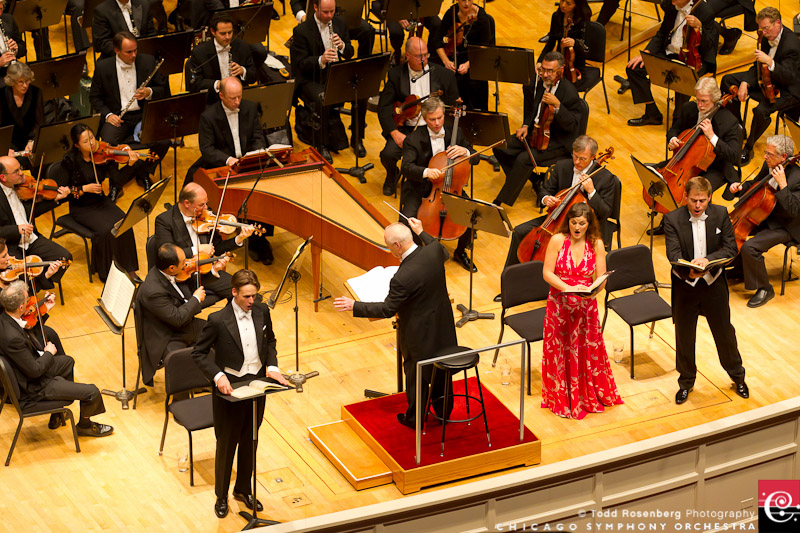Haitink, Chicago Symphony scale Haydn’s “Creation” with insight and aplomb

Bernard Haitink conducts the Chicago Symphony Orchestra, CSO Chorus and soloists in Haydn's "The Creation" Thursday night. Photo: Todd Rosenberg
What is it about older conductors and the masterpiece of Haydn’s maturity — if not his entire career — The Creation?
Sir Georg Solti was so devoted to the work in his later years that he not only programmed it twice during his tenure as Chicago Symphony Orchestra music director, but he actually recorded the complete work both times.
At 82, Dutch conductor and former CSO principal conductor Bernard Haitink is taking up his first-ever traversal of the beloved Haydn oratorio this week at subscription concerts.
Whereas Solti preferred the German version (Die Schöpfung), Haitink has opted for the English version. The libretto’s history is complicated: while the adaptation it was based on was indeed written in English, it was recast in German for the non-English-speaking Haydn to set, who then had that version translated back to English, but insisted that the work be published in both languages.
The problem that Solti and many Schöpfung purists have pointed to over the years is that the English version is further removed from Haydn himself, who set the German text, not the English one. Thus, there is an irregular lineup of syllables and text when the often awkwardly translated English version is performed.
Of course, with subtitles, none of this would matter, but these concerts instead chose to offer a printed version of the text in the program, which meant lots of ill-timed and noisy page shuffling during the performance.
Still, there is much to be said for hearing in the vernacular specifically what is being created—even if too much of the soloists’ diction was such that intelligibility would have been minimal without direct access to the text.
German bass-baritone Hanno Müller-Brachmann, who took on the roles of Raphael and Adam, tended to oversing his arias yet he also provided some of the evening’s vocal highlights with his stellar story-telling in recitatives.
His “In the beginning” was breathtaking in its hushed subtlety and tenderness while Müller-Brachmann’s account of the creation of animals had an operatic intensity, climaxing with the larger creatures and exquisitely complemented by instrumental effects of trombones and contrabassoon.
British tenor Ian Bostridge sang of the creation of light with immense optimism and genuine illumination, a stunning effect combined with Haydn’s striking orchestral music evoking light. Bostridge also used a similar effect to considerable aplomb in “In splendor bright is rising now.”
Bostridge’s voice has flowered into an instrument of immense beauty, but sometimes at the expense of textural clarity as he tended to swallow many of his consonants, exaggerating the sustained sound of his vowels.
Swedish soprano Klara Ek sang the roles of Gabriel and Eve with vocal flexibility and assured technique, though her words were often indecipherable — as in last week’s Mahler 4 — and there was little excitement in her upper lines with anticlimactic high notes. Nonetheless, she and Müller-Brachmann blended well for the Adam and Eve duets at the end of the work.
The real star of Thursday’s performance was Duain Wolfe and the Chicago Symphony Chorus, which at nearly eighty voices — about a third larger than the mid-sized orchestra that Haitink engaged — employed such sterling diction that every word of the English text was heard with crystal clarity without sacrificing choral lushness.
Kudos, too, to the sensitive and responsive playing of the orchestra, and to Haitink for being willing to take up such a new and invigorating challenge at the autumn of a long career when many conductors are content to rest on their laurels. If Haitink did not always generate the drama and excitement that Solti brought to this work, he more than compensated with his commitment, transparency and insight.
The program will be repeated 8 p.m. Friday and Saturday. 312-294-3000; cso.org.